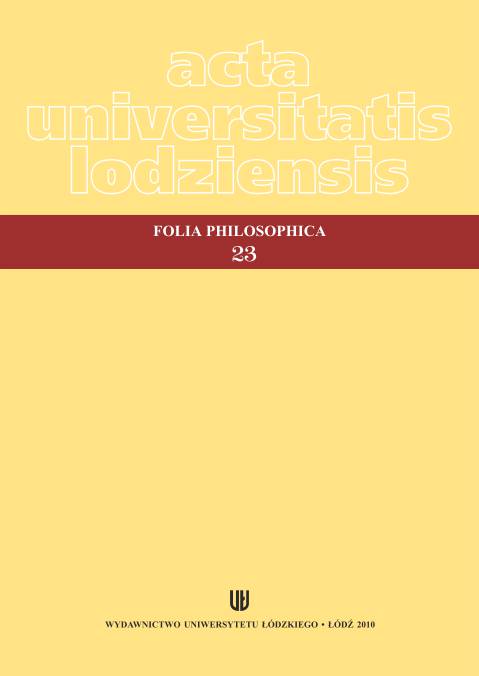Renesansowa koncepcja duszy w ujęciu H. C. Agrippy von Nettesheim na podstawie "De occulta philosophia"
DOI:
https://doi.org/10.18778/0208-6107.23.09Abstrakt
In my article I present the conception of soul of Cornelius Agrippa based on his greatest work "De occulta philosophia" which is a kid of summa of natural and occult philosophy, hermeticism, cabbala, astrology, humanistic theology, medicine, and alchemy. Henricus Cornelius Agrippa von Nettesheim (1486-1535) was a famous renaissance philosopher, cabalist, astrologer and theologian whose contribution in renaissance philosophical deliberations is significant but still unknown in Poland. Agrippa's notion of soul is very important for his own project of new pure magic which is described in his opus magnum. Therefore agrippian magic contains and perfects three kinds of knowledge: phisics, mathematics and theology. In the similary way Agrippa divided whole Cosmos in to three worlds. First and the most inferior world of the threefold Cosmos is the world of four elements of substance in Aristotle's meaning. The second one is the world of celestial bodies which comprises planets, stars and laws that rule them, and which is above the first world. The third one is the divine world of angels, soul of the world with platonic ideas and other intelligibilities. The three kinds of knowledge which Agrippa also called "regulative philosophy" are very useful for human in studying of each of three agrippian worlds. From this point of view also notion of humanity is very important for Agrippa. By the similarity between the macro- and microcosmos which appear in Agrippa's thought also human soul is threefold. Thus human soul contains in hierarchical order three parts viz.: idolum (which is the most inferior), ratio (being the middle part) and mens (which is on highest position in human soul). Each part has its own function which can be fully activated by God's light received by mens. In describing of functions of threefold soul Agrippa receives inspirations from prior philosophers like Aristotle, Awicenna or Awerroes. Another cause which emphases a great role of the agrippian conception of the soul is its connection with oryginal concepts of phantasy and threefold melancholy which is similar to the treepartite soul. Those two concepts are the examples of the influences of celestial powers which source is in stars and planets.
Bibliografia
Agrippa, C. 1992, De occulta philosophia sive de magia libri tres, ed. V. Perrone Compagni. Leida, New York, Colonia: E. J. Brill.
Google Scholar
DOI: https://doi.org/10.1163/9789004450707
Agrippa, H. C. ab Netteshym 1533, De occulta philosophia libri III, Colonia.
Google Scholar
Agrippa, H. C. von Nettesheim 2009, O filozofii tajemnej trzy ksiegi (fragmenty), ed. T. S. Cieślik. W: Hybris 8 (2009).
Google Scholar
DOI: https://doi.org/10.18778/1689-4286.08.07
Ernst, G. 2003, Profecja, natura i polityka. Studia nad myślą Tommaso Campanelli, w: Renesans i Reformacja. Studia z historii filozofii i idei, t. 24, (tł. A. Dudzińska – Facca). Warszawa: Instytut Filozofii i Socjologii PAN.
Google Scholar
Lalande, A. 1960, Vocabulaire technique et critique de la philosophie. Paris.
Google Scholar
Llinares, A. 1963, Raymod Lulle, Philosophie de l’action. Grenoble.
Google Scholar
Mazur, P. S. 2004, O nazwach intelektu. Lublin: Wydawnictwo KUL.
Google Scholar
Nauert, Ch. G. jr. 1965, Agrippa and the crisis of renaissance thought. Urbana: University of Illinois Press.
Google Scholar
Nauert, C. G. jr. 2007, Heinrich Cornelius Agrippa von Nettesheim. W: Stanford encyclopedia of philosophy, http://plato.stanford.edu/entries/agrippa-nettesheim
Google Scholar
Yates, F. A. 1964, Giordano Bruno and the hermetic tradition. London: Routledge & Kean Paul.
Google Scholar
Pobrania
Opublikowane
Jak cytować
Numer
Dział
Licencja

Praca jest udostępniana na licencji Creative Commons Attribution-NonCommercial-NoDerivatives 3.0 Unported License.












